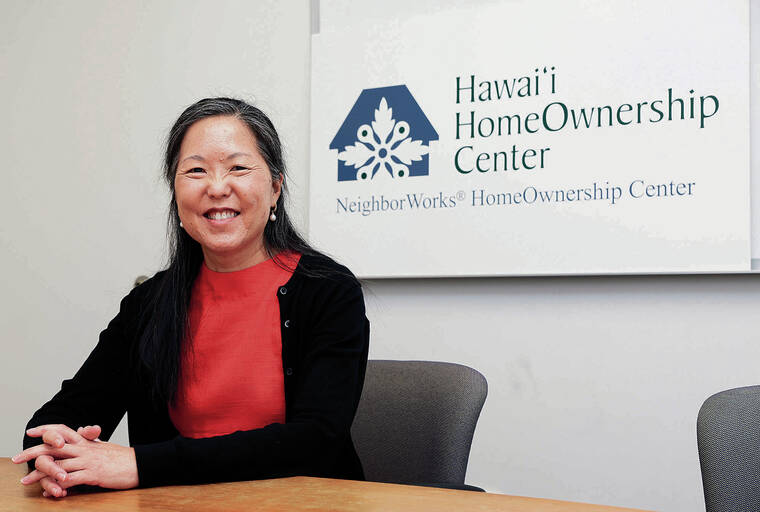BIO FILE: Reina M. Miyamoto
Title: Executive director, Hawai‘i HomeOwnership Center
Background: Central YMCA membership and residence director; Hawai‘i HomeOwnership Center program director; executive director, HHOC HHOC Mortgage; HHOC Housing and Land Trust
Community: National NeighborWorks Association board member; Hawaii Hurricane Relief Fund board member
Family: Mom Amy; brother Wynn and sister-in-law Shelley; two cats, Halloween and Tuxedo
One more thing: October 2025 marks 22 years of service for HHOC
——
Q1. What does Hawai‘i HomeOwnership Center (HHOC) offer, and who does it help?
A1. HHOC offers classes, programs and homeownership coaching, as well as referrals to outside sources of assistance. Lifetime access to services and assistance is available to members. Our programs provide an understanding of the home-buying process and help homebuyers reach financial and emotional readiness to move forward.
With 325 to 350 would-be homebuyers enrolling in our program annually, our membership demographics are similar to Honolulu’s. Over half of our participants have incomes that are 80% of the area median income or less. Typically, at least 120 members usually achieve homeownership (though they may not buy in the same year they enroll). In 2022 and 2023, high home prices and mortgage interest rates kept the home-buyer count lower. And in 2021 and 2024, as the U.S. Department of Housing and Urban Development-approved counseling agency for buyers purchasing affordable units in Hawaii Housing Finance and Development Corp. (HHFDC) projects, we had unusually high homeowner counts.
Q2. How are you funded?
A2. We have a budget of $968,500 for 2025. Grants, fees for our agency counseling programs and solicited contributions fund HHOC, with added support from in-kind contributions. NeighborWorks America, a nonprofit network distributing federal grants, is our primary source. Congress included stable NeighborWorks funding this year.
Fundraising is primarily managed by a committed group of volunteers: We hold a golf tournament, fundraising lunch, and a Flavors of Neighbors gala. The board of directors also engages in fundraising.
Q3. The HHOC commissioned the University of Hawaii Economic Research Organization (UHERO) to document how construction-defect litigation affects housing prices and availability. What did UHERO find?
A3. In addition to common and well-known barriers to home ownership, including limited supply, high costs and complex legal and regulatory requirements, UHERO found that construction liability litigation is a growing complication. Litigation is a disincentive for builders, slowing down home production if attached to a staged development.
Homeowners are impacted by litigation costs, which have dramatically increased the cost of insurance for builders. This raises costs for buyers. Additionally, refinancing a loan, borrowing against equity or selling a home can be difficult or out of reach.
The cost of litigation can also have significant impacts on new home prices and buy-sell timelines.
Q4. How does this litigation over construction affect HHOC operations?
A4. Financing affects affordability for working individuals and families who want to buy a home. When litigation is underway, buyers may not be able to access government subsidized or guaranteed loans; this can affect HHOC clients by that otherwise might allow for no or low down payments and lower interest rates for financing.
HHOC’s affiliate, HHOC Mortgage, offers down payment and closing cost assistance programs; the litigation crunch affects HHOC Mortgage’s ability to provide assistance.
Q5. Are there solutions?
A5. HHOC supports a process that facilitates getting repairs done if construction defects exist and providing quick and complete resolution. This allows for faster turnarounds and accelerated purchases, sales and additional home-building, which spurs movement in the “housing ladder” (moving from a starter-home to a larger home, so the starter-home is available for another family).
We need continued commitment and investment by builders and construction companies in Hawaii to fill the need for affordable and entry-level homes. Therefore, we need builders to be healthy and successful in our market. There needs to be a balance between protecting and supporting homeowners and ensuring developers continue to provide quality housing.
BONUS Q. What incentivizes commercial home-builders, lenders and other businesses along the home ownership pathway to partner with HHOC?
What I’ve seen at HHOC is that the people and companies that support our programs do it because they want more people and families to have a home in Hawaii. Often, it’s a personal value, and they want to support what we do.
Additionally, employers benefit in having a stable, hardworking workforce; this is directly correlated to the availability of affordable, stable housing. Companies may contribute to support a stronger economy and community.
HHOC benefits housing-related businesses, including builders, by helping buyers become mortgage-ready. Other government agencies could also benefit, as does HHFDC, by providing buyers of affordable units with homebuyer education.

